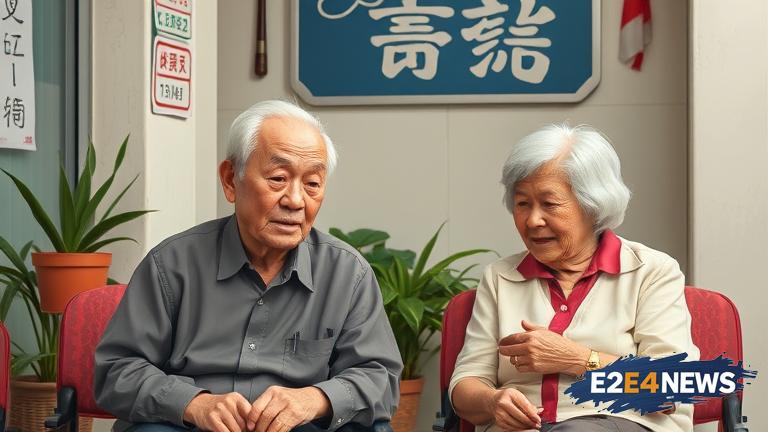Taiwan has witnessed a significant increase in its senior citizen population, with the number of people aged 65 and above reaching a record high. This demographic shift has sparked concerns over the country’s ability to provide adequate healthcare and social support for the elderly. The Taiwanese government has been working to address these concerns, with initiatives such as increasing funding for healthcare services and implementing policies to support elderly care. However, experts warn that more needs to be done to ensure that the country’s elderly population receives the care and support they need. The rise in senior citizens has also led to an increase in age-related diseases, such as dementia and Alzheimer’s, which can have a significant impact on the healthcare system. Furthermore, the growing elderly population has also raised concerns about social isolation and loneliness, which can have negative effects on both physical and mental health. To combat this, community-based programs and social services have been established to provide support and companionship for elderly individuals. Additionally, the government has implemented measures to encourage elderly individuals to remain active and engaged in their communities, such as through volunteer work and recreational activities. Despite these efforts, challenges remain, including a shortage of healthcare professionals and a lack of affordable housing options for seniors. The Taiwanese government has also been working to promote intergenerational relationships and community engagement, recognizing the importance of social connections for elderly individuals. Moreover, the rise in senior citizens has also led to an increase in demand for elderly care services, including home care and institutional care. To meet this demand, the government has been investing in the development of elderly care infrastructure, including nursing homes and adult day care centers. However, concerns have been raised about the quality of care provided in these facilities, highlighting the need for greater oversight and regulation. The Taiwanese government has also been working to promote age-friendly communities, recognizing the importance of creating environments that are supportive and inclusive of elderly individuals. This includes initiatives such as improving accessibility and mobility, as well as promoting age-friendly housing and transportation options. Furthermore, the government has also been working to address the issue of elderly poverty, recognizing that many seniors struggle to make ends meet. To combat this, initiatives such as pension reforms and social assistance programs have been implemented. Despite these efforts, challenges remain, including a lack of awareness about available resources and services, as well as a shortage of funding for social programs. The rise in senior citizens has also led to an increase in demand for technology-based solutions, including telehealth and digital health platforms. To meet this demand, the government has been investing in the development of digital health infrastructure, including electronic health records and telemedicine services. However, concerns have been raised about the accessibility and usability of these technologies, highlighting the need for greater investment in digital literacy programs. Overall, the rise in Taiwan’s senior citizen population presents both challenges and opportunities, highlighting the need for a comprehensive and multifaceted approach to addressing the needs of elderly individuals. By investing in healthcare, social support, and community-based programs, the Taiwanese government can work to ensure that its elderly population receives the care and support they need to thrive.
